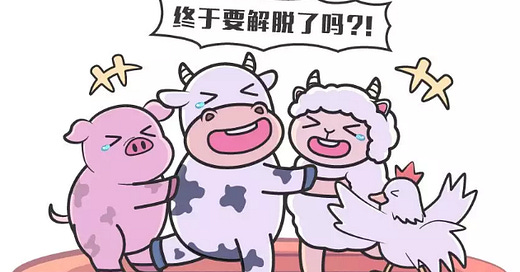This is the 2nd edition of the China Animal Welfare Translations Newsletter! You don’t know what that is? Then check out the “About” page on the website!
Please keep the great feedback coming! While the 1st edition was all about official policy, this edition focuses on much less formal material from social media. I’m keen to hear how you think these different approaches compare. Simply send a short informal message by email. You can also still fill in this form for content suggestions! This newsletter is in a very early stage, so your feedback can help me a lot to make sure that the content is tailored to the needs and interests of my readers!
You can subscribe to the newsletter here and browse through an archive of all past editions.
1. Translation: Artificial Meat so Intensely Promoted by Celebrities - Science or Hoax?
Read the full translation yourself here.
My two cents:
Some background:
In May this year, the Chinese celebrity Guan Xiaotong (关晓彤) caused a scandal on Chinese social media by posting a promo video for plant-based meat dumplings of the new brand Zhiai Shenghuo.
Some netizens questioned whether she even swallowed the dumplings in the video. The hashtag #关晓彤 植物肉# (#Guan Xiaotong | Plant-based meat#) subsequently became trending on the Chinese micro-blogging platform Weibo, attracting 600.000.000 views (yes, that’s almost half the number of China’s population)!
The focus of online debate quickly shifted from Guan Xiaotong to the product itself.
For a more complete discussion of the background, I highly recommend this excellent article on SubChina.
Here, I translated a blog post from the WeChat channel “Sai Lei 3 minutes”. The channel offers accessible and fun explainers in cartoon style for a wide range of trending topics.
This post explains what artificial meat is, and offers great insight into how the concept is understood in the unique context of Chinese cuisine. The post was viewed 100k+ times.
Cartoon picture from the translated blog post: “Will we finally be free from suffering?”
What does this document mean for the future of plant-based meat in China?
First off: While online influencers and Key Opinion Leaders (KOLs) have a real and well-documented role in influencing Chinese consumers, letting celebrities promote plant-based meat is not necessarily the right way to go. As one netizen commented: “Haha, these days the credibility of lots of celebrities is utterly worthless. They never take responsibility for the quality of the products they promote. Plant-based meat? Not even dogs would eat that!”
There are multiple challenges for plant-based meat in the Chinese market. This blog post and the comments below it highlight two key questions that companies have to get right.
Question 1: What should plant-based meat in China be called?
There are multiple different Chinese terms, all of them referring to something slightly different. This can be confusing for consumers who do not really know what they are actually eating.
For example, 人造肉 (artificial meat, “man-made meat”), 植物肉 (plant-based meat), 培育肉 (cultivated meat), and 素肉 (vegetarian meat) all evoke different connotations.
It is far from obvious which name is the “best” branding for a certain product; maybe all of the currently used terms are suboptimal.
Question 2: What exactly can be the role of plant-based meat in Chinese cuisine?
As one netizen remarked: “Soft bean curd (豆花), dried beans (豆脑), dried bean curd (豆干), dried bean skin (豆皮), dried bean dregs (豆渣), gluten (面筋), whatever, aren’t those tasty? They’re cheap and delicious!”
Companies need to first understand for themselves and then communicate how exactly artificial meat relates to these more traditional Chinese alternative protein products and why it deserves a place in Chinese cuisine. That’s not an easy task.
Read the full translation yourself here.
2. Translation: Account of a New Vegetarian - the Long Journey from Meat to vegetarianism
Read the full translation yourself here.
My two cents:
Some background:
According to somewhat outdated and imprecise data from 2013/14, just around 3-4% of Chinese are vegetarian.
Compared to ~10% in Western Europe, 5% in the US, and 30-40% in India.
Keep in mind: despite low percentages, the absolute number of vegetarians in China is still huge.
The translated text is a very touching account of a young Chinese woman who just became vegetarian. It was published on a public WeChat channel called “Vegetarian Diet”.
I encourage you to read the full translation to get a detailed sense of both her reasons for becoming vegetarian and her struggles on the way.
What does this document mean for animals in China?
Good news: Just as anywhere else in the world, people in China may choose to become vegetarian for a wide variety of reasons. Moral concerns over the suffering inflicted on the animals as well as personal health were important motivators for this woman.
Social pressures can be a barrier to becoming vegetarian: “I did not want to be the abnormal one in the group, so I started to eat meat when eating together with other people.”
General caveat to keep in mind for both translations in this edition: These social media translations can only give a snapshot view into the thoughts of some individuals in China, by no means do they represent “the Chinese” stance on any of these topics.
Read the full translation yourself here.
I want to thank Isla who helped out with the 2nd translation and provided plenty of good feedback for this edition!




